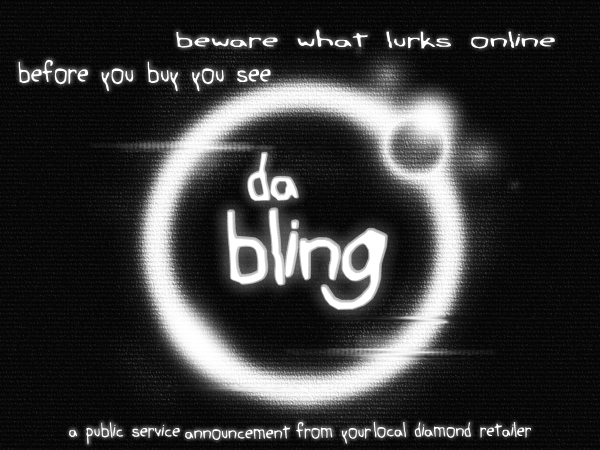Google Moon. Enough said.
Now here's some coolness: a "wooden mirror" that can replicate your image (or a television signal, or whatever). Kind of like a macroscale version of a Texas Instruments DLP, which also works by having many small elements that can be individually tilted to create an image.
-Anthony
-Anthony
Which one, you ask? Oh. Let's see... uh, well, first of all, in health the low levels of radiation used in X-rays may pose a cancer risk after all, though it is a slight one - but on the other hand moderate sun exposure, long-derided for its potential for skin cancer, may prevent more cancers than it causes by helping the body generate cancer-fighting vitamin D. Or in particle physics and cosmology, it's hard to keep track of who's found a crack in the Standard Model and the Big Bang theory this week ... and which of those from last week have then been labeled crackpots this week.
But the theory I was actually thinking of was the traditional story of how humans got to the New World: by a land bridge, 11,000 years ago. According to New Scientist, 40,000 year old footprints preserved in ash may upset this view. The scientists who discovered and studied the footprints have no idea how humans got there so early --- but they are confident enough about the the dating of their footprints to ask other scientists to check their work.
This isn't the first time that evidence has surfaced that humans were there earlier, but traditional scientists wanted to ignore the evidence in favor of their models: "The conventional view is that humans arrived in the Americas via Beringia around 11,000 years ago, when a land bridge became available between Siberia and Alaska. There have been claims about earlier waves of settlers, who must have made the crossing over water, based mainly on sites with signs of habitation dated up to 40,000 years ago, but these claims have drawn intense criticism."
SO obviously this new evidence will need to be carefully vetted, as the scientists who put it forward themselves claimed. But, in the end, the truth will come out, found by people who are willing to look clearly at difficult problems with an open mind, clearing away the smudges from the screen until the phenomenon can be seen clearly, or not at all. The truth does NOT come to those who reject the data before them out of hand, on the specious principle that "extraordinary claims require extraordinary evidence": that kind of thinking caused people to deny the movement of the Earth around the Sun, or of the continents upon the Earth, or of rocks from the sky to the Earth itself.
On that note, and of those people, I am reminded of Thomas Jefferson's thoughts on meteorites: "Gentlemen, I would rather believe that two Yankee professors would lie than believe that stones fall from heaven."

I, on the other hand, think we should let the data speak for itself.

But the theory I was actually thinking of was the traditional story of how humans got to the New World: by a land bridge, 11,000 years ago. According to New Scientist, 40,000 year old footprints preserved in ash may upset this view. The scientists who discovered and studied the footprints have no idea how humans got there so early --- but they are confident enough about the the dating of their footprints to ask other scientists to check their work.
This isn't the first time that evidence has surfaced that humans were there earlier, but traditional scientists wanted to ignore the evidence in favor of their models: "The conventional view is that humans arrived in the Americas via Beringia around 11,000 years ago, when a land bridge became available between Siberia and Alaska. There have been claims about earlier waves of settlers, who must have made the crossing over water, based mainly on sites with signs of habitation dated up to 40,000 years ago, but these claims have drawn intense criticism."
SO obviously this new evidence will need to be carefully vetted, as the scientists who put it forward themselves claimed. But, in the end, the truth will come out, found by people who are willing to look clearly at difficult problems with an open mind, clearing away the smudges from the screen until the phenomenon can be seen clearly, or not at all. The truth does NOT come to those who reject the data before them out of hand, on the specious principle that "extraordinary claims require extraordinary evidence": that kind of thinking caused people to deny the movement of the Earth around the Sun, or of the continents upon the Earth, or of rocks from the sky to the Earth itself.
On that note, and of those people, I am reminded of Thomas Jefferson's thoughts on meteorites: "Gentlemen, I would rather believe that two Yankee professors would lie than believe that stones fall from heaven."

I, on the other hand, think we should let the data speak for itself.

SO, I just participated in the MIT Weblog Survey, the latest attempt by the Georgia Tech of the North's Media Laboratory to replicate the success of the GVU's WWW User Surveys. :-)
Seriously, all smackdaddy talk aside, blogging is the latest thing (well, the second-to-most-latest thing, after podcasting) in the evolution of the Internet, and it's important that we try to understand it.
So, if you blog, help the guys up north and take the survey:

- the Centaur
Seriously, all smackdaddy talk aside, blogging is the latest thing (well, the second-to-most-latest thing, after podcasting) in the evolution of the Internet, and it's important that we try to understand it.
So, if you blog, help the guys up north and take the survey:

- the Centaur
Been feeling "off" lately? Does your daily horoscope no longer seem SO relevant just to you? Well, now we know why:

In the wake of the successful Deep Impact probe, an astrologer is now suing NASA over the irreparable harm it caused to "the natural balance of the forces of the universe."
Whoops. Sorry about that. For those who have been suffering more long-standing dysphoria, however, NASA scientists had this to say:
We had nothing to do with it.

Seriously, guys, if an entire comet (the astrological symbol of doom) smacking into the largest planet (the astrological symbol of luck) isn't going to deform your horoscopes, there's no way 300 pounds of copper dinging a comet will.
-the Centaur

In the wake of the successful Deep Impact probe, an astrologer is now suing NASA over the irreparable harm it caused to "the natural balance of the forces of the universe."
Whoops. Sorry about that. For those who have been suffering more long-standing dysphoria, however, NASA scientists had this to say:
We had nothing to do with it.

Seriously, guys, if an entire comet (the astrological symbol of doom) smacking into the largest planet (the astrological symbol of luck) isn't going to deform your horoscopes, there's no way 300 pounds of copper dinging a comet will.
-the Centaur
Erich Gamma, one of the software luminaries behind the Design Patterns book and now part of the Eclipse Project, had the following things to say about software ... that apply to a little more than just software:
You know, all artists should probably learn this lesson. It's easy to plan the Great American Novel or the Next Great SF/Fantasy Trilogy, but in the meantime write some damn stories, paint some paintings, write a webcomic, and get your stuff out there.
-the Centaur
Eclipse's Culture of Shipping: "In software, having cool ideas is nice, but shipping them is what counts. For us it only counts if you have shipped the thing. That's really the mindset we have. And given that you focus on shipping, we never want to be in a mode of always being two years away from shipping. You need to have a short-term deliverable. You also plan, decide and act with this mindset."
You know, all artists should probably learn this lesson. It's easy to plan the Great American Novel or the Next Great SF/Fantasy Trilogy, but in the meantime write some damn stories, paint some paintings, write a webcomic, and get your stuff out there.
-the Centaur
One of my fellow DragonWriters, Sandy Parsons, just got published in The Nth Degree fanzine with the following story of friends and fine dining: Friends and Food. I can't figure out how to describe it without giving away the punchline, so go enjoy.
-the Centaur
-the Centaur
A few random thoughts from recent conversations:
You know the best way to improve British food? Cook something else.
Some people's cell phone contracts last longer than their marriages.
Saying that the web is an engine for delivering vast amounts of irrelevant information is like saying that a library is a building for warehousing vast amounts of irrelevant books. Of course - if you can't be bothered to learn to use them.
-the Centaur
About the Author: "Anthony Francis is a computer scientist who eats fish and chips on a regular basis. His longest cell phone contract lasted 1 year longer than his longest relationship, and if anywhere is a vast collection of irrelevant books, his house is it."
You know the best way to improve British food? Cook something else.
Some people's cell phone contracts last longer than their marriages.
Saying that the web is an engine for delivering vast amounts of irrelevant information is like saying that a library is a building for warehousing vast amounts of irrelevant books. Of course - if you can't be bothered to learn to use them.
-the Centaur
About the Author: "Anthony Francis is a computer scientist who eats fish and chips on a regular basis. His longest cell phone contract lasted 1 year longer than his longest relationship, and if anywhere is a vast collection of irrelevant books, his house is it."
My honey Sandi Billingsley has a new showing of art at the Lambert Gallery. The Solstice show looks like it's going to be pretty interesting ... Sandi's new faux stone frames go well with her sanded style of art, and much of the other art looked interesting too. Check it out this Friday at Lambert!
-the Centaur
-the Centaur
Other people have blogged this, but it is so ridiculous that I had to post this as well. Armed national guard soldiers being shipped to fight for America in Iraq are being asked to give up their nose hair clippers before flying:
All which confirms my belief that airline security is riddikulus. Unfortunately, you can't banish it like a boggart once you realize what it really is: a showy facade of security designed to make selfish, unreflective, self-absorbed people without a clear moral grasp on liberty feel good about air travel, thus distracting them from the serious debates about national security policy issues that might actually improve our safety (Should we arm pilots? Why aid Israel? How can we achieve oil independence? How do we prevent today's allies of convenience from turning into tomorrow's enemies a la Castro, Noriega, Saddam, etc.? What can we do to promote nuclear non-proliferation. How do we show leadership on international issues without creating more fear of American power?).
Riddikulus. Nope. Still didn't work - the crazy distractions are all still there, masquerading as supersized Senate deadlocks over activist reality show judges and pro/anti-globalism factions kung fu fighting over This Week's "Trial Of The Century".
Riddikulus.
-the Centaur
King, who in civilian life is the Doraville police chief, rolled his eyes at the FAA regulation that requires soldiers - all of whom were armed with an arsenal of assault rifles, shotguns and pistols - to surrender pocket knives, nose hair scissors and cigarette lighters. "If you have any of those things," he said, almost apologetically, "put them in this box now."
All which confirms my belief that airline security is riddikulus. Unfortunately, you can't banish it like a boggart once you realize what it really is: a showy facade of security designed to make selfish, unreflective, self-absorbed people without a clear moral grasp on liberty feel good about air travel, thus distracting them from the serious debates about national security policy issues that might actually improve our safety (Should we arm pilots? Why aid Israel? How can we achieve oil independence? How do we prevent today's allies of convenience from turning into tomorrow's enemies a la Castro, Noriega, Saddam, etc.? What can we do to promote nuclear non-proliferation. How do we show leadership on international issues without creating more fear of American power?).
Riddikulus. Nope. Still didn't work - the crazy distractions are all still there, masquerading as supersized Senate deadlocks over activist reality show judges and pro/anti-globalism factions kung fu fighting over This Week's "Trial Of The Century".
Riddikulus.
-the Centaur
Batman begins.
Oh yea verily, he does.
Now that was a movie. Revenge of the Sith had mythmaking and sensory overload, but Batman Begins was the most ... well, involving movie that I've seen in a long time ... since Finding Neverland, I guess.
(Speaking of "finding Neverland," among the previews was a sneak peek at "Charlie and the Chocolate Factory". It was Michael Jackson level creepy and looked almost as unappealing as "Kingdom of Heaven" or "Cinderella Man". (Note I have not seen any of those movies; I merely found the previews so unappealing that I didn't want to see them. I mean, really! "Chocolate Factory" with a Michael Jackson-ized Johnny Depp as Willy Wonka? "Kingdom" with giant Tolkien-esque battles sans mythos or any recognizable characters? Or "Cinderella" with yet ANOTHER paper-thin depression era story of an underdog who wins big - didn't we do that back with Little Orphan Annie?)
Anyway, "Batman Begins" was great stuff. I believed in the character, his motivation, his limits. I wanted his car. And NO neon tubes were used in the making of any costume that I could see. The movie, while not "understated" by any means, focused more on storytelling than on static visual impact. I could critique the fight scenes as a bit too rushed and hard to follow, but it worked for what they were trying to achieve - and to focus on the fights would distract from the great story: how Bruce Wayne became Batman.
So go see it!
-the Centaur
Oh yea verily, he does.
Now that was a movie. Revenge of the Sith had mythmaking and sensory overload, but Batman Begins was the most ... well, involving movie that I've seen in a long time ... since Finding Neverland, I guess.
(Speaking of "finding Neverland," among the previews was a sneak peek at "Charlie and the Chocolate Factory". It was Michael Jackson level creepy and looked almost as unappealing as "Kingdom of Heaven" or "Cinderella Man". (Note I have not seen any of those movies; I merely found the previews so unappealing that I didn't want to see them. I mean, really! "Chocolate Factory" with a Michael Jackson-ized Johnny Depp as Willy Wonka? "Kingdom" with giant Tolkien-esque battles sans mythos or any recognizable characters? Or "Cinderella" with yet ANOTHER paper-thin depression era story of an underdog who wins big - didn't we do that back with Little Orphan Annie?)
Anyway, "Batman Begins" was great stuff. I believed in the character, his motivation, his limits. I wanted his car. And NO neon tubes were used in the making of any costume that I could see. The movie, while not "understated" by any means, focused more on storytelling than on static visual impact. I could critique the fight scenes as a bit too rushed and hard to follow, but it worked for what they were trying to achieve - and to focus on the fights would distract from the great story: how Bruce Wayne became Batman.
So go see it!
-the Centaur
Voyager 1 has entered the termination shock. Mankind at last takes a step outside the solar system.
To quote the Bentusi from "Homeworld": Welcome to the Unbound.
-the Centaur
To quote the Bentusi from "Homeworld": Welcome to the Unbound.
-the Centaur
From The String Coffee Table:
I know it means something. In fact I know enough physics to get the gist of some of what it's saying and to know where to look up the rest. So I really shouldn't pick on this ... it's perfectly clear for its intended audience.
However, I just can't get enough of "the well-known Deligne hypercohomology forumation of strict abelian p-gerbes". It's just using the phrase "well-known" in a way I hilariously wasn't previously aware of. :-) :-)
-the Centaur
Unless I am hallucinating the following is the correct formalism to generalize the well-known Deligne hypercohomology formulation of strict abelian p-gerbes to weak and nonabelian p-gerbes.
I know it means something. In fact I know enough physics to get the gist of some of what it's saying and to know where to look up the rest. So I really shouldn't pick on this ... it's perfectly clear for its intended audience.
However, I just can't get enough of "the well-known Deligne hypercohomology forumation of strict abelian p-gerbes". It's just using the phrase "well-known" in a way I hilariously wasn't previously aware of. :-) :-)
-the Centaur
I found the following draft deep in my Blogger archives - from almost three years ago, in fact! I don't remember precisely what was really irritating me, so I can only attempt to finish the article; regardless, here's my best bet of reconstructing what was bothering me.
I started worrying when restrictions were clamped down on Chinese blogs on top of the already restrictive Great Firewall:
My next, knee-jerk comment was: "I know, you think, that's just China. Nope:"
My next thought was "Of course, many of you may be thinking, this can't happen here." Feh:
Let's see, where was I? OK, next I was planning to talk to the script kiddies, free downloaders and open source zealots: "you think they can't get you." Wrong again:
Best of luck getting that principle to work when someone else with more money or who feels their power is threatened decides YOU're the one doing something they don't like. Wake up, people. All the things you don't want to see, or want to see happen to other people you don't like: guess what, they can happen to YOU.
The only thing historically that has served to stop these atrocities (big and small) from happening is to push extremely broad protections down to the fricking constitutional level and then to stand by them even when they prove inconvenient for your wallet or sense of security.
-the Centaur
I started worrying when restrictions were clamped down on Chinese blogs on top of the already restrictive Great Firewall:
BBC NEWS | Technology | Chinese blogs face restrictionsI was really worried that this would get worse over time. At my 50,000 foot view, I think this fear turned out to be justified.
"The internet has profited many people but it also has brought many problems, such as sex, violence and feudal superstitions and other harmful information that has seriously poisoned people's spirits," said a statement on the MII website, explaining why the new rules were necessary.
It has developed a system which will monitor sites in real time and search each web address for its registration number. Any that are not registered will be reported back to the Ministry, the statement said.
Known as the Great Firewall, the filtering system used by the Chinese government is not entirely unbreachable; for every new restriction and technical door that it slams shut, the Chinese people find a hack, a workaround or an entirely new way of communicating.
But one anonymouse China-based blogger told Reporters Without Borders that when he phoned the MII to register he was told not to bother because "there was no chance of an independent blog getting permission to publish".
My next, knee-jerk comment was: "I know, you think, that's just China. Nope:"
Iran jails blogger for 14 yearsNo fucking spit, that's what they aimed to do. Since I cobbled together my initial notes on this, Iran's and China's ongoing success at keeping a lockdown on their citizenry makes these comments by protesters in the Iran case seem laughable:"By handing down this harsh sentence against a weblogger, their aim is to dissuade journalists and internet-users from expressing themselves online or contacting foreign media."
Yeah, but "the mullahs" want you to know what they're doing so that bloggers in their country will crap your pants and keep their traps shut for fear of losing 20% of their life expectancy to the inside of a totalitarian regime's jail."The eyes of 8 million bloggers are going to be more focused on Iran since Sigarchi's sentence, not less.
"The mullahs won't be able to make a move without it be spread across the blogosphere."
My next thought was "Of course, many of you may be thinking, this can't happen here." Feh:
Apple makes blogs reveal sourcesTalking out of my orifice, it seems to me really odd that in our country the judicary has continued to stretch some concepts to the breaking point --- for example, stretching the definition of "public good" in eminent domain to the point that it covers taking someone's home so a developer can build a new shopping mall --- while others, like the public interest in shield laws, get squeezed out or even thrown out because of little technicalities like the publication being a blog rather than a newspaper. Oh wait, I forgot to follow the money - it no longer seems odd to me now.
In making his ruling, Judge Kleinberg said that laws covering the divulging of trade secrets outweighed considerations of public interest.
California has so-called "shield" laws which protect journalists from prosecution if what they are writing about can be shown to be in the public interest.
The Judge wrote: "...it is not surprising that hundreds of thousands of 'hits' on a website about Apple have and will happen. But an interested public is not the same as the public interest".
Let's see, where was I? OK, next I was planning to talk to the script kiddies, free downloaders and open source zealots: "you think they can't get you." Wrong again:
DVD Decrypter Author Turns Tail, Coughs Up CodeThat left me feeling "Gee, I hope no-one closes off the Internet." But now, a few years later, I find that you can easily look out there and find a lot of people who want it to happen for anyone who's not using the internet just like them:
The DVD Decrypter author has announced that he has been served with an order to cease his development of DVD Decrypter. The developer has been forced to hand over all source code and the domain that he was using. It is thought that it could be Sony who have served this notice, as it is rumoured that he broke their new copyright protection within 72 hours of its release."
Nice. Self-centered idiots irritate the heck out of me. I love reading Mark Cuban and his blog but short of P.Z. Meyers, I can't think of anyone who is more in a need to spend a mile walking in someone else's shoes to understand how insular his point of view is.Why Tiered Broadband is a Wonderful Thing and ASIVS
If the choice is between your being able to download more movies or other video and my getting the best possible speed from my internet connection, I'm thrilled when you get kicked off. It can't happen soon enough. Speed is what I need. Take all your P2P downloads and get the hell off my internet.
I have no sympathy for bandwidth hogs. You all are productivity killers for the rest of us. People who are working, people who are trying to play games, people who are in virtual worlds, people who are networking, people who are just trying to watch a Youtube video or their favorite TV show, you all are the reason why we get incredibly annoyed by slowdowns and buffering.
Leave and take your bit torrent client with you.
Best of luck getting that principle to work when someone else with more money or who feels their power is threatened decides YOU're the one doing something they don't like. Wake up, people. All the things you don't want to see, or want to see happen to other people you don't like: guess what, they can happen to YOU.
The only thing historically that has served to stop these atrocities (big and small) from happening is to push extremely broad protections down to the fricking constitutional level and then to stand by them even when they prove inconvenient for your wallet or sense of security.
-the Centaur
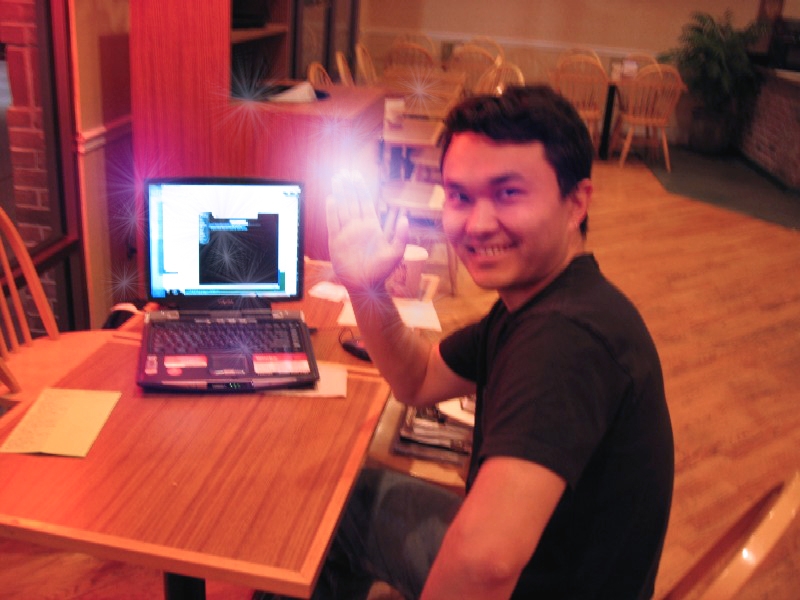
SO many of you (where many is defined as N greater than or equal to one) may remember that the Wiki was down for "security reasons". Well, this wasn't that someone had hacked the site, trashed the data or even just spammed the comments pages: it was, more literally, a security issue with my web hosting provider, which tightened its security provisions on script hosting and killed OddMuse, the wiki engine I was using. Fortunately Bolot Kerimbaev, a friend from Taido class, uses the same wiki engine and the same service provider, and he told me that the use of semicolons rather than ampersands in the URLs was causing the problem. A simple fix, really.
Well, not so simple.
I worked at it for a while, but found that other features were broken on my site as well ... because semicolons were EVERYWHERE in URLs in the OddMuse code. At first I tried changing them individually, then, as the problem got more complex, decided to try to abstract out the separator character into a $SEP variable that I could change and control. That worked well ... for a while ... but eventually the OddMuse instance I was working on became unstable, then stopped working entirely. Because I'd been futzing around with vi on a local directory and uploading the Perl script to my web site rather than using proper source control (for shame!), I couldn't even roll things back successfully without losing all of my changes.
SO I called Bolot for help, and we got together at Atlanta Bread Company at Perimieter Point to take care of the problem. This Atlanta Bread Company (one of their best stores) is right next to a Starbucks Coffee, which kindly provides T-Mobile Wi-Fi. So we logged in and tackled the problem, and after a few minutes showing Bolot what was going wrong, he took over the keyboard to fix it.
And a whole lot more.
First, rather than laboriously editing the files locally and uploading them with FTP, Bolot suggested we use SSH and edit the files in place so we could see the changes immediately. This point is so important I'm going to follow it up with a separate post, but that's another blog for another day. Now, apparently I got through thirteen and a half years of Georgia Tech without using SSH extensively (I almost always relied upon remote X Windows logins prior to my Windows/Cygwin days) so this option never occurred to me. Bolot, however, was able to do it almost instantly:
ssh -l username hostname
Moreover, we found that using the Cygwin instance on my laptop, we could not just SSH in to the site ... but could actually use VIM, the enhanced VI editor. And with a few quick commands, he had syntax highlighting and color schemes working - remotely, via SSH, in the bash window already set up in Cygwin on my machine. Other than the window title and the lack of a toolbar, it looked identical to the gVIM I frequently use on my machine.
vim
:colors darkblue
:set nu
(Note tab completion actually works on setting the colors!
After finding and fixing the first and most important of the problems, we then went to test. Bolot immediately became frustrated with my Internet Explorer installation and turned to my copy of Firefox instead, which was hopelessly out of date. Within moments, he showed me why people use Firefox: within moments he was able to painlessly install gesture support, web developer tools, a variety of search tools, flash blocking, ad blocking, and a host of other applications which made the Firefox experience almost palatable, despite the fact that its interface is still slower, clunkier and uglier than IE. Shortly thereafter, Bolot was able to find and eliminate the rest of the problems in OddMuse, realizing that the problem was not semicolons in URLs in general, but the presence of the string ";id" in the URL. By the time he was done, he had not just corrected the problems in OddMuse itself, but also other problems with my installation which were interfering with stylesheets.
SO: an improved browser, web site, method of connecting to the web site, and a whole host of other tools. All delivered straight to my brain in less than an hour.
Lessons learned: Be dogged with your tools. Find out all they have to offer you. Use them as they were best intended. And be dogged about eliminating problems in your way. Make it possible to get feedback on changes instantly, so you make many small changes safely and feel free to experiment. Then, you will be able to work far faster than you ever thought possible.
More thoughts on this later .... but, until then, hats off to you, Bolot Kerimbaev, Technology Commando.
-the Centaur
Well, after 8 months, the zeroth chapter of fanu fiku has come to a close.
Breaking my arm was less of a barrier to finishing the story than trying to teach a class at the same time I was prepping for a Mars trip. Life lesson: you can only do so much.
Since the comic is already a month behind my self-imposed schedule, I plan (ha! ha! good one) on rolling into the next issue without delay. fanu fiku issue 1: manifestations will begin next week.
-the Centaur
Breaking my arm was less of a barrier to finishing the story than trying to teach a class at the same time I was prepping for a Mars trip. Life lesson: you can only do so much.
Since the comic is already a month behind my self-imposed schedule, I plan (ha! ha! good one) on rolling into the next issue without delay. fanu fiku issue 1: manifestations will begin next week.
-the Centaur
Ok. Sith made 50 million in its first day, and by now almost 1 in 10 Americans have seen it, so we can proceed without spoiling anything for anyone:
At last, Obi-Wan Kenobi gets to kick ass.
For almost the entire Star Wars saga, Obi-Wan gets pantsed by everyone he encounters. Sure, he lops off arms in bar-room brawls, bats blaster ricochets into legions of droids, and even kills Darth Maul, but outside that, put him toe-to-toe with a Jedi or trained bounty hunter and he falls to pieces. In the Phantom Menace, he's basically a young punk who can't even keep his lightsaber charged - Qui-Gon carries him through the whole movie until whacked by Maul, which apparently energizes the young Kenobi enough for him to pull his weight. But by Attack of the Clones Obi-Wan had devolved into a pompous, dismissive arrogant twat that Anakin carried through the whole movie.
Now, don't get me wrong - I thought it was stone cold of him to leap through that window onto a fleeing assassin droid to try to track it back to its master, and thought he held his own pretty good against Jango Fett while being fired on by an entire starship. But one of my good buddies put it best: in the end, he loses just about every fight. The bounty hunter picks him off at a quarter mile, after which he's rescued by Anakin. Then baby-faced Boba Fett gives him the Slave II smackdown. Finally he gets schooled by Count Dracula - excuse me, Dooko - only to get saved by, yes, you guessed it, Anakin - who in Attack of the Clones can't pull his weight either, requiring a Muppet-ex-machina save by Master Kermit - excuse me, Yoda - and his newly energized CGI powers.
Now, Sith starts off the same way. While he does well against legions of the can't-shoot-straight stork droids, Obi-Wan still can't fly, gets re-schooled by Dooku and then literally carried out by Anakin. But almost immediately he starts showing signs of maturity. He credits Anakin for his hard work and derring-do, rather than smacking him down, tries to help him cope with the Jedi council's duplicitous ways, and ultimately flat-out tells Anakin how much he admires him before hurling himself into the forefront of the war.
Where. He. Kicks. Ass.
Unlike the reckless Qui-Gon, Obi-Wan is shown to think carefully about his moves, even the boldest of them: leaping straight down into an enemy army to call out Grievous. For the entire rest of the movie, Obi-Wan out-fights, out-thinks and out-plans all of his foes, smacking down Grevious' troops, slicing up Grevious himself, and even outwitting his own clone troopers when they turn on him. In the final climactic battle with the newly minted Darth Vader, Obi-Wan excellently plays above his weight, staying toe-to-toe with someone More Powerful Than Any Jedi while at the same time constantly manipulating the battlefield to his advantage. Like Darth Maul luring Qui-Gon before him, it's Obi-Wan that lures Anakin out onto catwalks and platforms where his sheer power can no longer help him; it's Obi-Wan that keeps an eye out for lava around them, and it's Obi-Wan who maneuvers himself out of danger, always with an eye for Anakin's sword as he's doing so. In contrast, Anakin whacks away at Obi-Wan like he's trying to cut down a tree, and is constantly suprised when he finds himself dodging lava or trying to escape from a sinking platform while Obi-Wan is waving at him from the high ground.
At first I was disappointed that Obi-Wan had to use the terrain to defeat Anakin - as the same friend said earlier, the cool thing about the fight between Qui-Gon and Darth Maul is that Maul didn't throw sand in his eyes or make him slip on a banana peel: Qui-Gon just got beat by a superior opponent. But upon reflection, that's the point. Obi-Wan saw how Qui-Gon went down, and knew how he took Darth Maul out with Maul standing on the same high ground he now held over Anakin. He had experience. He distilled it into wisdom. And when Anakin came a-chopping, Obi-Wan held him, thought him off, and struck him down.
Anakin never really had a chance. When he intoned, "This is the end for you, my master," and leapt over Obi-Wan onto the platform, Obi-Wan could easily have nailed him in the back. Then when he landed, he stumbles, and Obi-Wan actually waited for him to get his footing and to bring the battle back to him, rather than press the advantage.
In reality, Obi-Wan was stringing him along - because he couldn't bear to kill hisfriend. But in the end, he did what needed to be done.
Obi-Wan Kenobi, you're my hero.
And you kick ass.
-the Centaur
At last, Obi-Wan Kenobi gets to kick ass.
For almost the entire Star Wars saga, Obi-Wan gets pantsed by everyone he encounters. Sure, he lops off arms in bar-room brawls, bats blaster ricochets into legions of droids, and even kills Darth Maul, but outside that, put him toe-to-toe with a Jedi or trained bounty hunter and he falls to pieces. In the Phantom Menace, he's basically a young punk who can't even keep his lightsaber charged - Qui-Gon carries him through the whole movie until whacked by Maul, which apparently energizes the young Kenobi enough for him to pull his weight. But by Attack of the Clones Obi-Wan had devolved into a pompous, dismissive arrogant twat that Anakin carried through the whole movie.
Now, don't get me wrong - I thought it was stone cold of him to leap through that window onto a fleeing assassin droid to try to track it back to its master, and thought he held his own pretty good against Jango Fett while being fired on by an entire starship. But one of my good buddies put it best: in the end, he loses just about every fight. The bounty hunter picks him off at a quarter mile, after which he's rescued by Anakin. Then baby-faced Boba Fett gives him the Slave II smackdown. Finally he gets schooled by Count Dracula - excuse me, Dooko - only to get saved by, yes, you guessed it, Anakin - who in Attack of the Clones can't pull his weight either, requiring a Muppet-ex-machina save by Master Kermit - excuse me, Yoda - and his newly energized CGI powers.
Now, Sith starts off the same way. While he does well against legions of the can't-shoot-straight stork droids, Obi-Wan still can't fly, gets re-schooled by Dooku and then literally carried out by Anakin. But almost immediately he starts showing signs of maturity. He credits Anakin for his hard work and derring-do, rather than smacking him down, tries to help him cope with the Jedi council's duplicitous ways, and ultimately flat-out tells Anakin how much he admires him before hurling himself into the forefront of the war.
Where. He. Kicks. Ass.
Unlike the reckless Qui-Gon, Obi-Wan is shown to think carefully about his moves, even the boldest of them: leaping straight down into an enemy army to call out Grievous. For the entire rest of the movie, Obi-Wan out-fights, out-thinks and out-plans all of his foes, smacking down Grevious' troops, slicing up Grevious himself, and even outwitting his own clone troopers when they turn on him. In the final climactic battle with the newly minted Darth Vader, Obi-Wan excellently plays above his weight, staying toe-to-toe with someone More Powerful Than Any Jedi while at the same time constantly manipulating the battlefield to his advantage. Like Darth Maul luring Qui-Gon before him, it's Obi-Wan that lures Anakin out onto catwalks and platforms where his sheer power can no longer help him; it's Obi-Wan that keeps an eye out for lava around them, and it's Obi-Wan who maneuvers himself out of danger, always with an eye for Anakin's sword as he's doing so. In contrast, Anakin whacks away at Obi-Wan like he's trying to cut down a tree, and is constantly suprised when he finds himself dodging lava or trying to escape from a sinking platform while Obi-Wan is waving at him from the high ground.
At first I was disappointed that Obi-Wan had to use the terrain to defeat Anakin - as the same friend said earlier, the cool thing about the fight between Qui-Gon and Darth Maul is that Maul didn't throw sand in his eyes or make him slip on a banana peel: Qui-Gon just got beat by a superior opponent. But upon reflection, that's the point. Obi-Wan saw how Qui-Gon went down, and knew how he took Darth Maul out with Maul standing on the same high ground he now held over Anakin. He had experience. He distilled it into wisdom. And when Anakin came a-chopping, Obi-Wan held him, thought him off, and struck him down.
Anakin never really had a chance. When he intoned, "This is the end for you, my master," and leapt over Obi-Wan onto the platform, Obi-Wan could easily have nailed him in the back. Then when he landed, he stumbles, and Obi-Wan actually waited for him to get his footing and to bring the battle back to him, rather than press the advantage.
In reality, Obi-Wan was stringing him along - because he couldn't bear to kill hisfriend. But in the end, he did what needed to be done.
Obi-Wan Kenobi, you're my hero.
And you kick ass.
-the Centaur
I saw Sith at midnight on Thursday, and while I decided to wait to comment on the *content* of the movie to avoid spoiling it for anyone, I find I cannot remain silent about the *effect* it had on me.
I enjoyed Sith, recognizing both strengths and weaknesses. Some moments we'd waited twenty years for: other, unexpected moments gave the original trilogy new resonance. But the real effect came the next day. My whole body felt like I had taken a physical blow. I was tremulous, hearing lightsabers and blasters echo through my head. Minor comments by characters stayed with me again and again, and my senses were finely tuned towards commentary by others around me who had seen it. Now, a day and a half later, I still hear the sabers clashing.
In short: George Lucas's patented sensory overload worked. The force was strong with this one.
-Anthony
I enjoyed Sith, recognizing both strengths and weaknesses. Some moments we'd waited twenty years for: other, unexpected moments gave the original trilogy new resonance. But the real effect came the next day. My whole body felt like I had taken a physical blow. I was tremulous, hearing lightsabers and blasters echo through my head. Minor comments by characters stayed with me again and again, and my senses were finely tuned towards commentary by others around me who had seen it. Now, a day and a half later, I still hear the sabers clashing.
In short: George Lucas's patented sensory overload worked. The force was strong with this one.
-Anthony
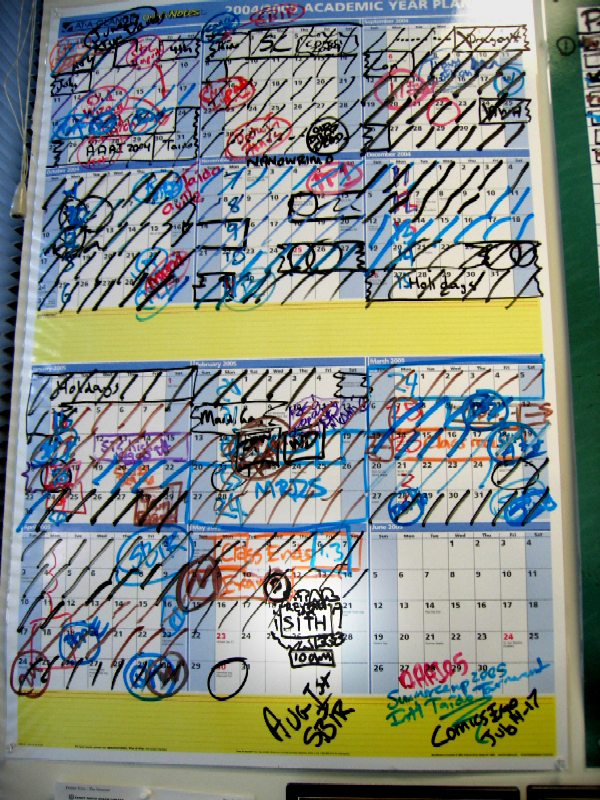
Now, at last, after decades, we know the truth:
Obi Wan Kenobi can kick Captain Kirk's ass.
Speaking as a long-time Star Trek fan, the evidence is unavoidable. After almost 2 continuous decades on the airwaves, Star Trek finally bowed out last Friday with the season finale of Enterprise. And tonight, after almost three decades, a rejuvenated Star Wars brings its *latest* trilogy to a close with a flourish, just as new TV series, games and countless comics spring to life.
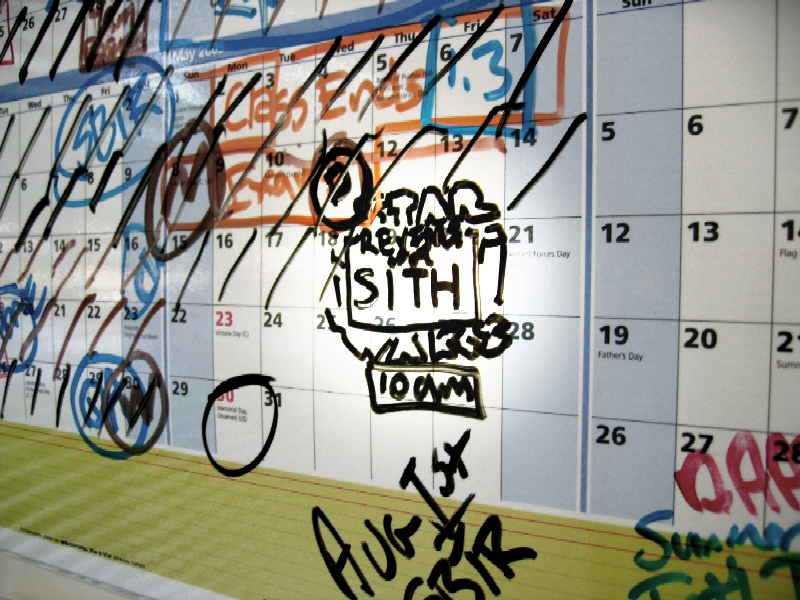
It's not that Star Trek and Star Wars were ever *really* in competition. As I see it, Star Trek laid the groundwork for the particular brand of space fantasy that George Lucas later capitalized on and perfected in his myth-making Star Wars franchise, just as Star Trek rejuvenated itself with a movie franchise after Star Wars changed the rules for movie blockbusters ... and just as the current Star Wars TV show owes its roots to a renaissance of science fiction television that began with Star Trek: The Next Generation. But this give-and-take, while it made the careers of new science-fiction auteurs like Whedon and Strazynski possible, cannot sustain itself forever; and now, Star Trek has petered out.
Not that I don't expect Star Trek to be reborn eventually. Doctor Who was resurrected, after all, as was Hitchhiker's, Lord of the Rings and even Star Wars itself (not to mention Batman, Superman and a host of older properties ... even House of Wax is a remake of a remake). But I think it will take some time for Trek to find its way again. Why?
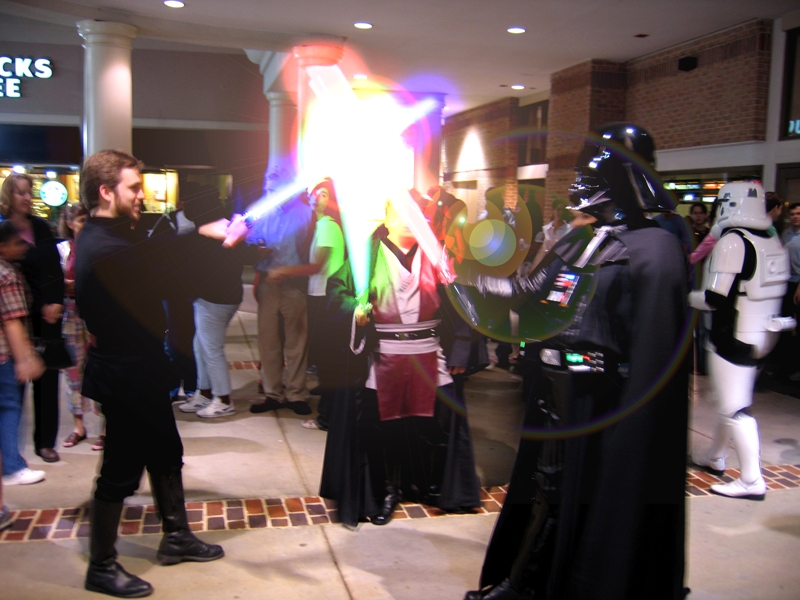
Certainly NOT for the reasons that the fanboys will pop forth with on their latest self-serving conspiracy theory sites and www.WhyTrekFailed.org blogs:
"They violated too much continuity" --- oh, grow up. Star Trek has been self-INconsistent since the first handful of episodes and that's not going to change now. The writers are telling stories, the best they can, and care about the continuity a hell of a lot more than you do --- after all, they made the career decisions that made it possible for them to be writers on Star Trek, and you're still stuck in your parent's basements.
"They had too much time travel" --- oh, shut up. Time travel has been one of the strongest elements of the new Star Trek over its last twenty years and if you're complaining about it, you obviously haven't been watching it, at least not as a fan. And if you were watching it not as a fan --- that is, watching in the hope it would fail --- then just shut the fuck up.
"Rick Berman is the spawn of Satan" --- well, maybe you have a point. I've heard some pretty bad stories about Mr. Berman from people who would know. But every artistic and technical success that I can think of off the top of my head had some quirky overbearing figure at the top --- The Macintosh's Steve Jobs, Star Wars' George Lucas, Titanic's James Cameron --- who makes bad decisions from time to time, but makes up for it with his incredible vision of what's possible to be achieved and his skill at pulling it off.
In the end what the fans think they like --- like continuity between episodes, as was tried with the Klingon arcs of the Next Generation and in the 3rd season of Enterprise --- end up repelling viewers. I think the real problem with Star Trek is purely pragmatic --- they did it too long, too consistently without enough of a break to rejuvenate themselves.

Say what you want about Lucas, but he works his ass off to make each and every Star Wars movie and learns after each one. Star Trek, in contrast, seems to have been caught on the endless network treadmill. It was on the wrong network in the wrong time slot with too much competition. It's blunders were big ones --- a controversial theme song, a captain miscast (or an actor misused) --- and when it changed, it changed too slowly. The third and fourth seasons of Enterprise were some of the strongest Trek since the final few seasons of Deep Space Nine, but by then the audience was draining, the show moved to a bad timeslot.
It's the curse of science fiction television: for a show to get really good, it has to have a free hand to maintain an audience. Farscape worked not just because it worked, but also because the Sci Fi Channel could fire-hose fans with entire seasons over a weekend (where I got hooked) rather than squeezed in one night a week. Stargate worked because it could find its legs on Showtime, rather than die in the network shuffle. And Firefly worked, even though it got shuffled off the network coil, primarily because the DVD was cheap enough for fans to buy it and spread the word by word of mouth, rather than try to choke down the ridiculous hundred-buck bricks you see for other series. And somehow I think the straitjacket of network TV had to have a chilling effect on the creators of Trek that perhaps made them a little too slow on the draw to make the dramatic choices they ultimately did ... too late.
So, Trek will return. But let's hope that when it does return, it returns to a place that lets it have the flexibility it needs to make it a success.
Until then, there's always Star Wars --- coming soon 8pm Eastern, 9 Central.

